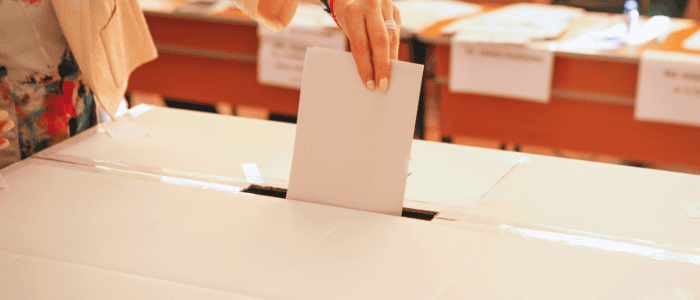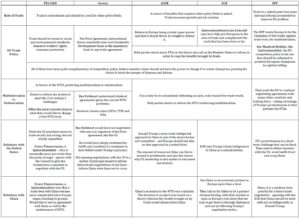Published
European Elections or: “How to Learn to Stop Worrying and Be Positive About Trade in the Future”
By: João Carvalho Natalia Macyra
Subjects: EU Trade Agreements European Union

With the elections for the European Parliament, multiple promises are made as politicians compete to gain voters and influence future policies. One might then ask, how will the outcome of these elections change Europe’s trade policy? Will the European Union continue its liberal approach or changes should be expected? For years, the EU trade executive, namely DG Trade, was a rather predictable creature. However, as the political climate in Brussels and Europe is changing, we should expect a little bit more friction in the future approach to open trade.
The newly elected MEPs will not only have to accept the new Commission’s president and College of Commissioners but will be also called upon to approve final texts of any future trade agreement. And since populists, eurosceptics, nationalists and general anti-trade tendencies are on the rise in the society, it might not be a smooth ride for the European Commission to get its deals signed off.
Forecasted election results show a slightly more complex structure of the future Parliament than in the previous years. The ‘easiest’ majority to come up with would be between the EPP, PES/S&D and ALDE. Since the three of them, including Macron’s En Marche!, also represent the majority in the European Council, it is likely to be the chosen coalition format. Especially because it is highly doubtful that a majority could be achieved only on the right or on the left – at least not without the hard-Eurosceptic parties. However, in regards to these parties’ positions on trade policy, some visible variations can be identified with PES/S&D being the distinct ‘outliner’.
The information included in the political programmes, campaign manifestos and statements given by the Spitzenkandidaten help us make some predictions about the direction of trade policy after May 2019. Although politicians run in national elections and represent national parties, once they become MEPs, it is the EP group affiliation that they serve. It means that once in the office, they will most likely follow group interest and vote according to the European-Eurosceptic rift.
(click the image to see it in full size)
Given some major disparities in the parties approach to trade and to avoid a stalemate, some budging is most likely to happen. Since the protectionism has become almost an exclusive position of the populists and has become a dirty word, we can expect that none of the above parties will follow that rhetoric. What is more probable is a bargain between a more traditional approach to trade and new progressive way focused on social rights and climate.
In a recent position paper by PES/S&D and other like-minded European partners, the authors acknowledge that trade is a divisive issue within the progressive movement and both compliment and criticise it. However, they desire to place themselves as critical free-trade enthusiasts. Furthermore, Timmermans, who is openly pro-trade, has been elected to represent and speak on the behalf of the whole party. This might mean that PES/S&D will be more hesitant to vote against trade agreements or block negotiation.
At the same time, Manfred Weber has been showing some openness to including social and environmental concerns in future trade talks. At least, that’s what comes out of his sometimes-clumsy referral to trading as fair trade. Even if sometimes, it is unnecessary to say.
Glad to see @ManfredWeber wants to build on EU's trade & sustainable development agenda – but our comprehensive deals already require partners to sign up to @ilo child labour conventions.
We've worked hard to make #EUTrade:
?open
?transparent
?values-basedLet's keep it up!
— Cecilia Malmström (@MalmstromEU) April 24, 2019
We can then argue that the current campaign and parties’ positions indicate that something might be workable and future trade deals are valued and sought after. It will then come down to, how the three parties will be able to spin achievement in their own way, and how much of trade negotiations will be more than just trade.
Election predictions and academic sources:
- Thierry Chopin et al. – http://institutdelors.eu/wp-content/uploads/2019/04/PP-237-Etude-des-clivages-E2019-v6-1.pdf
- https://www.politico.eu/2019-european-elections/
- Simon Hix et al. – https://onlinelibrary.wiley.com/doi/abs/10.1111/j.1540-5907.2006.00198.x
- Marc Hooghe & Sofie Marien – https://academic.oup.com/pa/article-abstract/67/3/536/1450000
The source of all parties’ positions can be found in:
- Bruegel – http://bruegel.org/europe2019/
- Alde – https://www.aldeparty.eu/sites/alde/files/40-Resolutions/2019_freedom_opportunity_prosperity_the_liberal_vision_for_the_future_of_europe_0.pdf
- ECR – https://www.acreurope.eu/files-acre-system/jz/JZ-Programme.pdf
- EPP – https://www.epp.eu/papers/epp-manifesto/ & https://www.eppgroup.eu/newsroom/publications/epp-group-position-paper-on-international-trade & https://www.eppgroup.eu/how-we-make-it-happen/working-groups/wg-foreign-affairs/international-trade & https://www.eppgroup.eu/what-we-stand-for/campaigns/eu-elections-2019/commitments/commitment/free-and-fair-trade
- Greens – https://vote.europeangreens.eu/manifesto
- PES/S&D – https://www.pes.eu/en/manifesto2019/ & https://www.socialistsanddemocrats.eu/publications/many-not-few-towards-progressive-model-international-trade-and-investment
